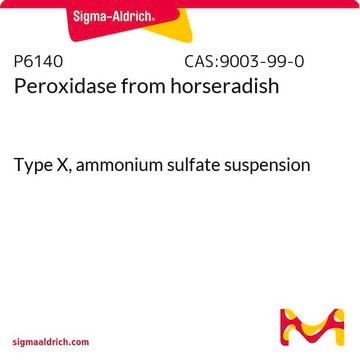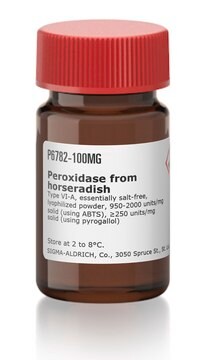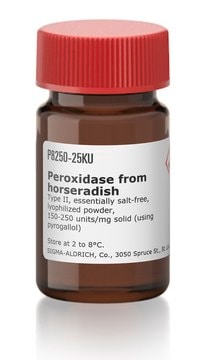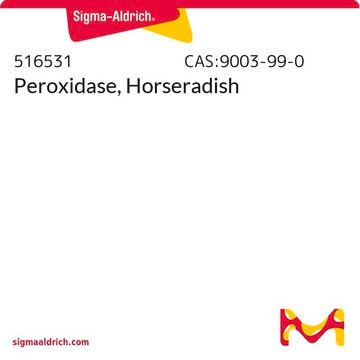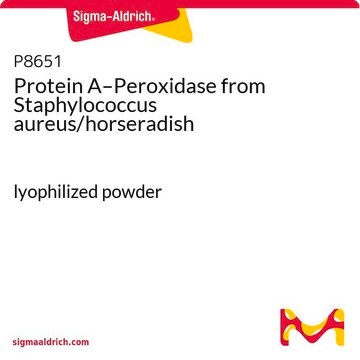P1709
Peroxidase, Maleimide Activated from horseradish
lyophilized powder, >200 units/mg protein
Synonym(s):
Maleimide activated HRP
Sign Into View Organizational & Contract Pricing
All Photos(1)
About This Item
Recommended Products
biological source
horseradish
Quality Level
form
lyophilized powder
specific activity
>200 units/mg protein
composition
Protein, ~50% E1%/403
extent of labeling
1-3 mol maleimide per mol protein
storage temp.
−20°C
Related Categories
General description
Peroxidase (POD) is an enzyme that includes a group of specific enzymes such as nicotinamide adenine dinucleotide (NAD) peroxidase, NADP peroxidase, fatty acid peroxidase and a group of non-specific enzymes from various sources. It is present in animals, higher plants and other organisms.
Application
For direct conjugation to compounds containing free sulfhydryl groups for use as an enzyme-linked detection reagent.
Instructions for use included. In a study on horseradish peroxidase, the Maleimide compounds succinimidyl 4-maleimidobutyrate and succinimidyl 6-maleimidohexanoate have been shown to be the most effective in the conjugation of Fab′ to horseradish peroxidase. This enzyme has also been used in a study to investigate the effectiveness in staining a mitochondrial protein, lipoamide dehydrogenase.
Instructions for use included. In a study on horseradish peroxidase, the Maleimide compounds succinimidyl 4-maleimidobutyrate and succinimidyl 6-maleimidohexanoate have been shown to be the most effective in the conjugation of Fab′ to horseradish peroxidase. This enzyme has also been used in a study to investigate the effectiveness in staining a mitochondrial protein, lipoamide dehydrogenase.
To increase signal intensity of immunoconjugates, immunoglobulins were synthetically modified to contain multiple primary amines and covalently coupled to maleimide activated peroxidase. This can result in more efficient conjugation and signal amplification.
Biochem/physiol Actions
Peroxidase (POD) helps in the dehydrogenation of several organic compounds like phenols, aromatic amines, hydroquinones etc.
Other Notes
Type VI peroxidase activated with maleimidocaproic acid N-hydroxysuccinimide ester.
Unit Definition
One unit will form 1.0 mg of purpurogallin from pyrogallol in 20 seconds at pH 6.0 at 20°C.
Physical form
Lyophilized powder containing trehalose and sodium citrate
Signal Word
Danger
Hazard Statements
Precautionary Statements
Hazard Classifications
Resp. Sens. 1 - Skin Sens. 1
Storage Class Code
11 - Combustible Solids
WGK
WGK 3
Flash Point(F)
Not applicable
Flash Point(C)
Not applicable
Personal Protective Equipment
dust mask type N95 (US), Eyeshields, Gloves
Certificates of Analysis (COA)
Search for Certificates of Analysis (COA) by entering the products Lot/Batch Number. Lot and Batch Numbers can be found on a product’s label following the words ‘Lot’ or ‘Batch’.
Already Own This Product?
Find documentation for the products that you have recently purchased in the Document Library.
Customers Also Viewed
Biochemical Methods (1996)
S Matuda et al.
In vivo (Athens, Greece), 1(4), 221-227 (1987-07-01)
IgG-maleimide peroxidase, Fab'-maleimide peroxidase, polymer and monomer types of Fab'-periodate peroxidase were prepared from an antibody against rat lipoamide dehydrogenase, a component of the pyruvate dehydrogenase complex which is located in mitochondria. They were examined for immunohistochemical staining of the
Subhash Dhawan
Peptides, 23(12), 2091-2098 (2003-01-22)
Immunoconjugates are widely used for indirect detection of analytes (such as antibodies or antigens) in a variety of immunoassays. However, the availability of functional groups such as primary amines or free sulfhydryls in an immunoglobulin molecule is the limiting factor
S Hashida et al.
Journal of applied biochemistry, 6(1-2), 56-63 (1984-02-01)
Nine different maleimide compounds were evaluated for the conjugation of Fab' to horseradish peroxidase through thiol groups in the hinge. The compounds evaluated were succinimidyl maleimidoacetate (I), succinimidyl 4-maleimidobutyrate (II), succinimidyl 6-maleimidohexanoate (III), succinimidyl 4-(N-maleimidomethyl)cyclohexane-1-carboxylate (IV), succinimidyl m-maleimidobenzoate (V), succinimidyl
Kitagawa, T., et al.
Chemical & Pharmaceutical Bulletin, 29(4), 1131-1131 (1981)
Our team of scientists has experience in all areas of research including Life Science, Material Science, Chemical Synthesis, Chromatography, Analytical and many others.
Contact Technical Service

